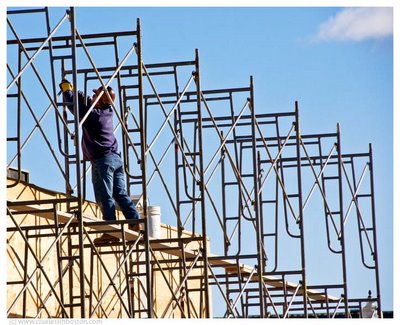Discover Leading Scaffolding Near Me for Your Home or Business Needs
Discover Leading Scaffolding Near Me for Your Home or Business Needs
Blog Article
Exploring the Various Types of Scaffolding Made Use Of in Building And Construction Jobs
The building sector depends heavily on numerous types of scaffolding to satisfy details project requirements, each offering unique advantages and applications. Typical structure scaffolding offers a sturdy structure for general tasks, while suspended scaffolding is necessary for work on high-rise structures.

Conventional Frame Scaffolding
Conventional frame scaffolding is just one of one of the most widely utilized approaches in the building sector because of its robustness and versatility. This system includes horizontal and upright frameworks that are assembled to develop a stable system for workers and products. The main elements consist of vertical blog posts, horizontal ledgers, and diagonal braces, which with each other offer a strong structure that can sustain significant tons.
Among the key advantages of standard frame scaffolding is its versatility to numerous building jobs, varying from household buildings to large industrial frameworks. The modular style allows for easy setting up and disassembly, making it reliable for both long-term and short-term projects. Additionally, the system can be personalized in height and width, fitting various structure styles and website problems.
Security is extremely important in scaffolding applications, and traditional frame systems are geared up with guardrails and toe boards to avoid falls and guarantee worker protection. Additionally, regular evaluations and adherence to safety regulations are critical in maintaining the integrity of the scaffold. On the whole, typical structure scaffolding stays an essential choice in the building and construction sector, offering a reputable platform for labor and boosting general job efficiency

Suspended Scaffolding
Suspended scaffolding uses a distinct remedy for construction tasks that require access to raised surfaces, especially in scenarios where conventional framework scaffolding may be impractical. This kind of scaffolding is generally suspended from the roofing system or top levels of a structure, using a system of platforms, ropes, and wheels to develop a functioning area that can be adjusted to various heights.
One of the primary advantages of put on hold scaffolding is its adaptability. It can be easily repositioned or lowered to fit modifications in building and construction needs, making it optimal for jobs such as home window installment, façade job, and upkeep on skyscraper structures. In addition, the marginal impact of put on hold scaffolding enables far better usage of ground room in urban atmospheres, where area is usually limited.
Safety is an important factor to consider in the usage of put on hold scaffolding. Appropriate rigging and securing systems need to be utilized to guarantee stability and avoid accidents. Operators has to additionally be educated in the safe use of this equipment. In general, suspended scaffolding provides a efficient and reliable service for accessing hard-to-reach areas in various building and construction circumstances, improving both efficiency and safety on site.
System Scaffolding
System scaffolding, often related to as a modern remedy in the scaffolding market, includes pre-engineered elements that can be quickly constructed and adapted for numerous building projects. Scaffolding. This type of scaffolding is characterized by its modular style, which enables adaptability and efficiency on task sites, fitting architectural needs and different elevations
Generally made from high-strength steel or light weight aluminum, system you can find out more scaffolding supplies enhanced longevity and stability. The components consist of vertical articles, straight ledgers, and diagonal dental braces, which adjoin safely, making sure a robust framework. The style often integrates standard installations, simplifying assembly and disassembly processes, therefore reducing labor time and expenses.

Rolling Scaffolding
Rolling scaffolding is a functional alternative to standard fixed scaffolding, designed for flexibility and simplicity of use on building websites. This sort of scaffolding includes a platform sustained by frameworks with wheels, enabling employees to easily move it as needed. The mobility attribute significantly boosts performance, as it minimizes downtime related to taking apart and assembling repaired scaffolding.
Generally created from lightweight products such as light weight aluminum or steel, rolling scaffolding provides a tough yet portable option for projects needing constant repositioning - Scaffolding. It is particularly helpful in jobs such as painting, drywall setup, and electric job, where access to different elevations and locations is required
Safety and security is paramount in rolling scaffolding scaffolder death style, with functions such as locking wheels to stop unplanned movement when in use, and guardrails to secure workers from falls. Furthermore, lots of versions are flexible in height, accommodating different task demands.
Cantilever Scaffolding

The style of cantilever scaffolding usually involves making use of arms or braces anchored to a structure or structure, making it possible for the platform to prolong outward securely. Safety is extremely important; therefore, these scaffolds have to be engineered to withstand different lots and environmental problems. Normal evaluation and upkeep are vital to guarantee architectural integrity and worker security.
Cantilever scaffolding is preferred for its adaptability and reliable use of area, making it a preferred choice in metropolitan settings where space restrictions prevail. It facilitates simpler accessibility to high altitudes, inevitably contributing to the overall effectiveness of building tasks. As with all scaffolding kinds, correct training and adherence to safety and security requirements are important for employees making use of cantilever scaffolding.
Conclusion
To conclude, the diverse sorts of scaffolding used in building jobs each serve distinctive purposes tailored to specific site requirements. Conventional frame scaffolding offers stability, while suspended scaffolding provides flexibility for elevated tasks. System scaffolding facilitates quick setting up, and rolling scaffolding boosts flexibility for differing job settings. Cantilever scaffolding successfully attends to challenges in metropolitan settings. Understanding these scaffolding kinds is crucial for maximizing safety and security and efficiency in building, eventually contributing to the successful conclusion of jobs.
Typical framework scaffolding provides a tough foundation for basic jobs, while suspended scaffolding is crucial for work on high-rise frameworks.Rolling scaffolding is a flexible alternative to standard fixed scaffolding, made for mobility and convenience of usage on building and construction websites. As with scaffolder jobs all scaffolding types, correct training and adherence to security standards are essential for workers utilizing cantilever scaffolding.
Standard frame scaffolding supplies security, while suspended scaffolding supplies flexibility for raised tasks. System scaffolding assists in quick setting up, and rolling scaffolding boosts wheelchair for differing work atmospheres.
Report this page